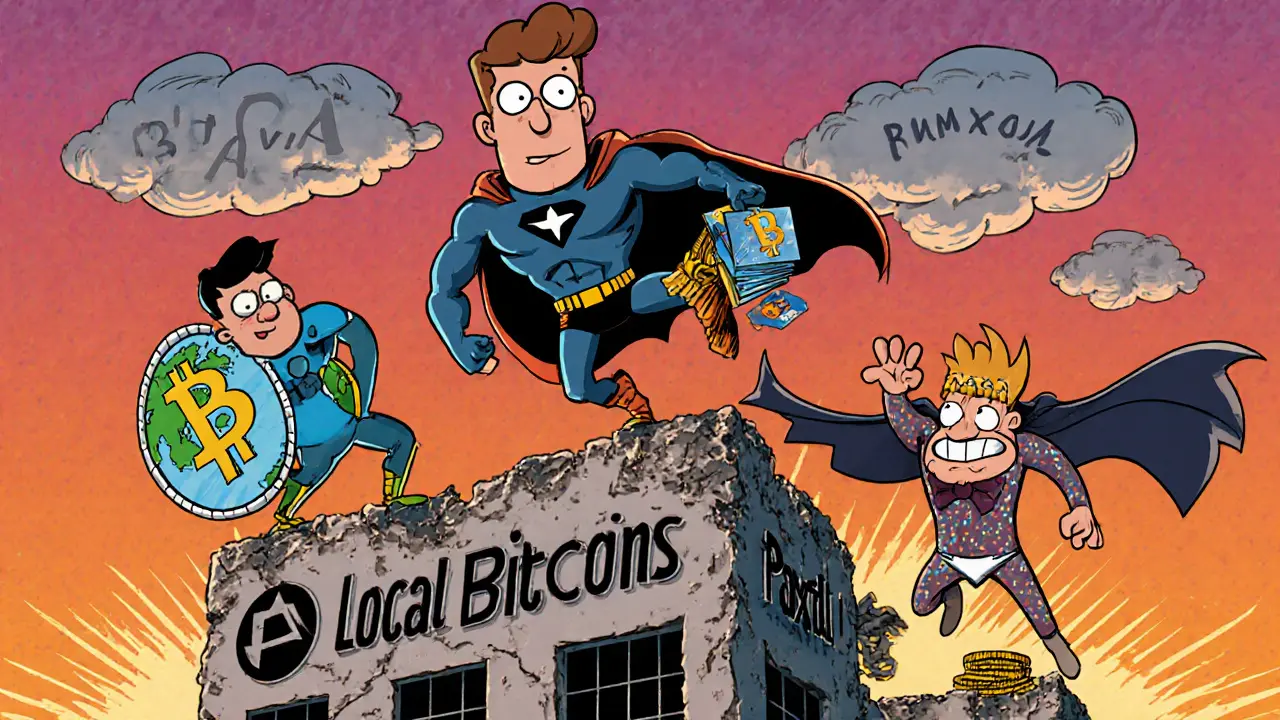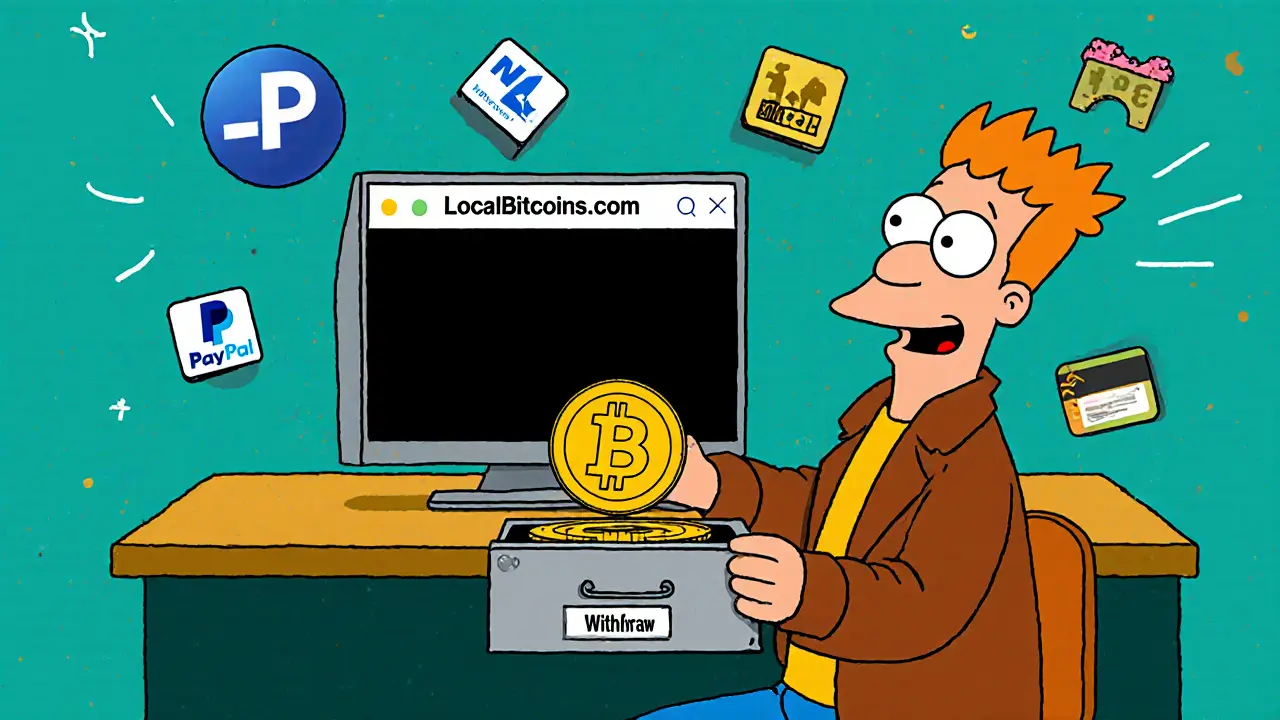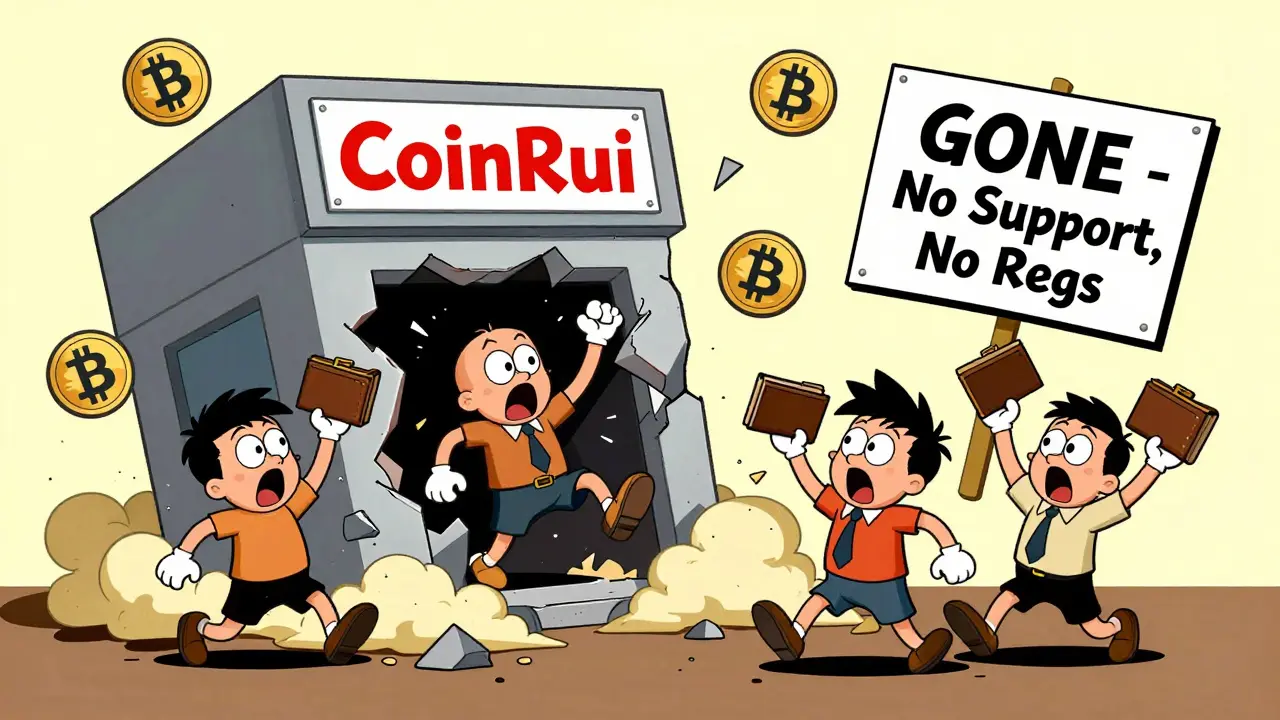LocalBitcoins Replacement Finder
Find Your Best Alternative
Answer a few questions to see which platform matches your needs best.
Results
Best Match
RecommendedOther Options
Try selecting different options or check if your country is supported by the alternatives.
Fill out the form above to see which platforms work best for you.
LocalBitcoins wasn’t just another crypto exchange. For over a decade, it was the go-to platform for people who wanted to buy or sell Bitcoin directly from other individuals - no bank approvals, no complex interfaces, just direct trades. It felt like Craigslist for Bitcoin: real people, real payments, real trust built through reputation. But as of 2025, LocalBitcoins no longer lets you trade. The site is gone. All you can do now is withdraw your Bitcoin. And that’s the story you need to know.
How LocalBitcoins Worked (Before It Shut Down)
LocalBitcoins connected buyers and sellers directly. If you wanted to buy Bitcoin with PayPal, cash deposit, or even gift cards, you found a trader nearby who accepted that method. The platform held your Bitcoin in escrow until you confirmed payment. Only then did the coins get released. That simple system kept scams low - most traders had 100+ successful deals and glowing reviews.
Unlike Coinbase or Binance, LocalBitcoins didn’t act as the middleman. It didn’t hold your money. It didn’t set the price. Prices were set by sellers - sometimes 5% above market, sometimes below. That flexibility was the whole point. If you lived in Nigeria, Venezuela, or Argentina, where banks blocked crypto purchases, LocalBitcoins was often your only option.
Verification was tiered:
- Tier 1: SMS confirmation - up to 1,000 EUR traded
- Tier 2: ID + selfie - up to 20,000 EUR
- Tier 3: Full KYC - unlimited trading
By 2019, even basic users had to verify their identity. That shift killed some of its early privacy appeal, but it was necessary. Regulators were watching. And in 2023, the final blow came: Europe’s MiCA rules forced the platform to shut down.
Why LocalBitcoins Closed
LocalBitcoins didn’t fail because people stopped using it. It failed because regulators made it impossible to keep running.
In 2018, it pulled out of New York because of BitLicense restrictions. In 2023, it announced it would stop all trading services. The official reason? Compliance with MiCA - the European Union’s new crypto law requiring strict licensing, KYC, and AML controls for all exchanges operating in or serving EU users.
LocalBitcoins was built for freedom - small trades, cash deposits, anonymous sellers. MiCA demanded centralized control, bank-grade compliance, and full user tracking. The platform couldn’t adapt without losing what made it unique. So it chose to shut down.
By July 1, 2025, only withdrawals remain active. No new accounts. No new trades. Just the ability to pull out your Bitcoin before the site fully closes.
What Made LocalBitcoins Stand Out
Even with its flaws, LocalBitcoins had strengths no other platform matched at the time:
- 120+ payment methods - Bank transfer, Western Union, Zelle, Payoneer, even iTunes cards
- Global reach - Operated in 248 countries, including places where other exchanges were banned
- Escrow protection - Bitcoin held securely until payment was confirmed
- No price manipulation - Sellers set rates; no artificial market-making
- Low fees - Only charged transaction fees, not monthly or holding fees
It was the only place where a student in Kenya could buy Bitcoin with a mobile money transfer. Where a freelancer in Argentina could cash out without a bank account. Where someone in rural India could trade BTC for UPI payments.
Users on G2 gave it a 4.2/5 rating. Reddit threads were full of stories like: “Escrow saved me twice when sellers tried to disappear after I sent money.”

The Downsides - Why It Wasn’t Perfect
But LocalBitcoins wasn’t easy for everyone.
- Too complex for beginners - Finding a seller, checking reputation, understanding payment methods - it took hours to learn
- Slow support - Dispute resolution could take 7-14 days. Some users reported losing money when support didn’t act fast enough
- Scams still happened - Fake screenshots, fake payment confirmations, impersonators. The escrow helped, but not 100%
- No mobile app - The website was clunky on phones
- In-person trades banned in 2019 - Once a major feature, cash meetups were removed due to safety concerns and regulatory pressure
Compared to Coinbase’s one-click buy, LocalBitcoins felt like learning to drive a manual car when everyone else was using automatics.
What Replaced LocalBitcoins?
LocalBitcoins’ shutdown left a huge gap - especially in emerging markets. Three platforms have stepped in to fill it:
| Platform | Supported Countries | Payment Methods | Escrow? | Best For |
|---|---|---|---|---|
| BitValve | 180+ (strong in Africa, Asia) | Bank, M-Pesa, UPI, PayPal | Yes | Users who want a direct LocalBitcoins replacement |
| Remitano | 150+ (popular in Southeast Asia) | Bank, Mobile Wallets, Cash Deposit | Yes | Quick trades in India, Philippines, Nigeria |
| Paxful (rebranded) | 100+ (limited in EU) | Gift cards, Payoneer, Cash App | Yes | Users who prefer gift card trades |
BitValve has captured the largest share of former LocalBitcoins users - around 28%. It’s the closest in feel: peer-to-peer, escrow-based, global. Remitano is faster and has a better mobile app, but fewer payment options. Paxful still works for gift card trades, but its reputation took a hit after its 2022 shutdown and revival.

What You Should Do Now
If you still have Bitcoin on LocalBitcoins:
- Log in before July 1, 2025
- Withdraw your BTC to your own wallet - not another exchange
- Don’t wait. After July 1, the site may go completely offline
- If you had funds in fiat, contact support immediately - those may be harder to recover
If you’re looking to buy or sell crypto now, switch to BitValve or Remitano. Both have escrow, similar fee structures, and work in regions where traditional exchanges don’t.
Is Peer-to-Peer Crypto Trading Still Viable?
Yes - but it’s changing.
LocalBitcoins proved there’s massive demand for decentralized, non-bank crypto access. 68% of crypto users in emerging markets still prefer P2P, according to the World Bank. But regulations are tightening. Every country now demands KYC. Every platform must track every transaction.
The future of P2P isn’t anonymous. It’s regulated - but still direct. Platforms like BitValve and Remitano are adapting. They keep the peer-to-peer model, but with stricter ID checks, faster support, and better apps.
LocalBitcoins was a pioneer. It gave people freedom. But freedom without rules doesn’t last. What comes next won’t be as wild - but it will be more sustainable.
Can I still trade Bitcoin on LocalBitcoins?
No. LocalBitcoins stopped all trading services in February 2023. As of now, you can only withdraw your Bitcoin or fiat funds. No new accounts, no new trades, no deposits. The platform is in wind-down mode and will fully shut down after July 1, 2025.
Is LocalBitcoins safe to use before it shuts down?
Yes, but only for withdrawals. The escrow system and reputation filters still work for any trades initiated before the shutdown. However, since no new users can join and support is limited, avoid starting new trades. Focus only on withdrawing your assets. Never send money to someone claiming they can “reactivate” your account - those are scams.
What happened to the in-person cash trades?
LocalBitcoins removed in-person cash trades in June 2019 due to safety concerns and increasing regulatory pressure. All trades after that had to be done digitally - bank transfers, PayPal, mobile payments. This change made the platform safer but also less flexible for users in areas without digital banking.
Which platform is the best replacement for LocalBitcoins?
BitValve is the closest replacement - same P2P model, escrow, global reach, and strong support in Africa and Asia. Remitano is better if you want a smoother mobile experience and faster trades. Paxful still works for gift card trades, but its reputation is weaker. Choose based on your payment method and region.
Why did LocalBitcoins shut down but other exchanges didn’t?
LocalBitcoins was built on a decentralized, flexible model that allowed small, anonymous trades with many payment methods. Other exchanges like Coinbase or Binance were designed from the start to comply with banking and financial regulations. When MiCA and similar laws came in, LocalBitcoins couldn’t adapt without losing its core identity - so it shut down instead.


Brian Gillespie
November 10, 2025 AT 21:10Atheeth Akash
November 12, 2025 AT 18:34Laura Hall
November 14, 2025 AT 14:13Arthur Crone
November 15, 2025 AT 23:45Michael Brooks
November 17, 2025 AT 04:44Michelle Elizabeth
November 17, 2025 AT 13:33Kylie Stavinoha
November 19, 2025 AT 00:03Ainsley Ross
November 19, 2025 AT 18:19Joy Whitenburg
November 20, 2025 AT 03:02FRANCIS JOHNSON
November 21, 2025 AT 11:28Noriko Yashiro
November 22, 2025 AT 08:15David Billesbach
November 23, 2025 AT 20:27James Ragin
November 24, 2025 AT 00:32Andy Purvis
November 24, 2025 AT 04:25Wayne Dave Arceo
November 25, 2025 AT 11:24Diana Dodu
November 27, 2025 AT 04:02Joanne Lee
November 28, 2025 AT 04:37Raymond Day
November 28, 2025 AT 23:23